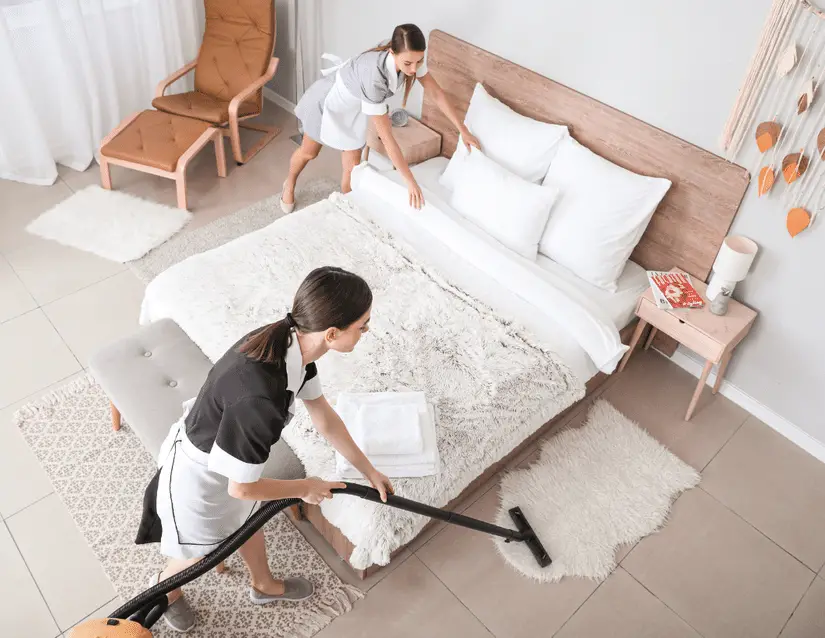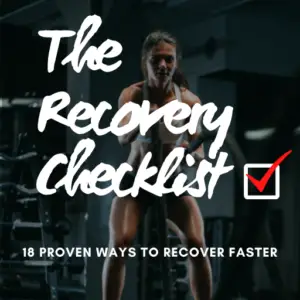Whether you can do household chores for exercise depends 100% on your expectations. Exercise has a mind-boggling placebo effect.
Ever had a day like this? Grocery shopping, laundry, cooking, cleaning, and yard work consume the entire morning and bleed into the afternoon.
By 3PM you’re wiped out. You haven’t made it to the gym or laced up your shoes for a run.
You’ve stayed active all day, which begs the question: Can I do household chores for exercise?
Let’s examine a creative study that answers this question.
How Much Exercise Do I Need?
Adults need 150 minutes of moderate intensity aerobic exercise per week, according to the American College of Sports Medicine. Moderate aerobic exercise includes biking, hiking, and brisk walking.
Short on time? 75 minutes of vigorous aerobic exercise per week is just as effective. Vigorous exercises include running, high intensity interval training (HIIT) and CrossFit.
Guidelines also recommend strength training 2 days per week to build muscle strength and endurance.

You can strength train with bands, free weights, machines or your own body weight. One controversial strength exercise is arguably the best exercise for low back pain.
The Chores Study
This fascinating 2007 study explores exercise and expectations. It also answers the question: can I do household chores for exercise?

Here’s what happened:
Scientists studied 84 female hotel room attendants. They informed half of the attendants that their work, cleaning hotel rooms, qualifies as good exercise and constitutes an active lifestyle. This education was the only intervention.
The other attendants, the control group, were told nothing.
4 weeks later, the scientists followed up with both groups. The education group felt they were getting more exercise at work, though researchers didn’t notice a difference in their activity levels.
And remarkably, the educated group lost weight, lost body fat, and lowered their blood pressure. All without changing their activity. Only their expectations changed.
What could possibly explain these bizarre findings? Consider these two possibilities.
1. The Placebo Effect
Just like taking a placebo pill creates positive physiological changes, believing you’re exercising enhances exercise-related benefits from an activity.
The study’s authors cite the placebo effect to explain the results. They conclude that some health benefits from exercise are attributable to the placebo effect.
To learn more about the weird world of placebo, check out this article: Adopt This Mindset to Live 14% Longer
2. Identity Shapes Behavior
People act consistently with their self-image. The education group suddenly saw themselves as exercisers. The control group did not. Perhaps the education group’s behavior changed, too. Maybe they started doing household chores for exercise.
Small, unnoticed differences likely contributed to their health improvements – like taking fewer rest breaks, exerting more effort at work or making healthier food choices.
Can I Think My Way to Weight Loss?
Unfortunately, it’s not so simple.
Eating a bushel of french fries still won’t shrink your waistline, no matter how hard you think about their vegetable-like properties.

Does the mind play a role? Absolutely.
Early research shows cognitive-behavioral therapy aids in weight loss. Likewise, strength athletes who think they are taking steroids (but aren’t) get stronger – until they learn the truth.
The Verdict
So, can you do household chores for exercise? Yes, if you have positive expectations.
Try this: Consider your light to moderate daily activities as good exercise in order to maximize their health benefits. And ensure you’re hitting your weekly exercise quota with aerobic and strength exercise.
Only 23% of Americans exercise enough each week, based on the physical activity guidelines. Be healthier than 77% of Americans by doing moderate exercise 150 minutes a week (including chores) and strength training at least twice per day.
Readers: Do you count household chores as exercise? Why do you think the study turned out like it did? Share your thoughts in the comments.
Looking for more evidence-based fitness tips? Join the free Facts & Physio Newsletter. Plus, get The Recovery Checklist when you sign up.


2 thoughts on “Household Chores for Exercise? The Strange Study Results”
How do I forward this to your sister?
She will love this one!